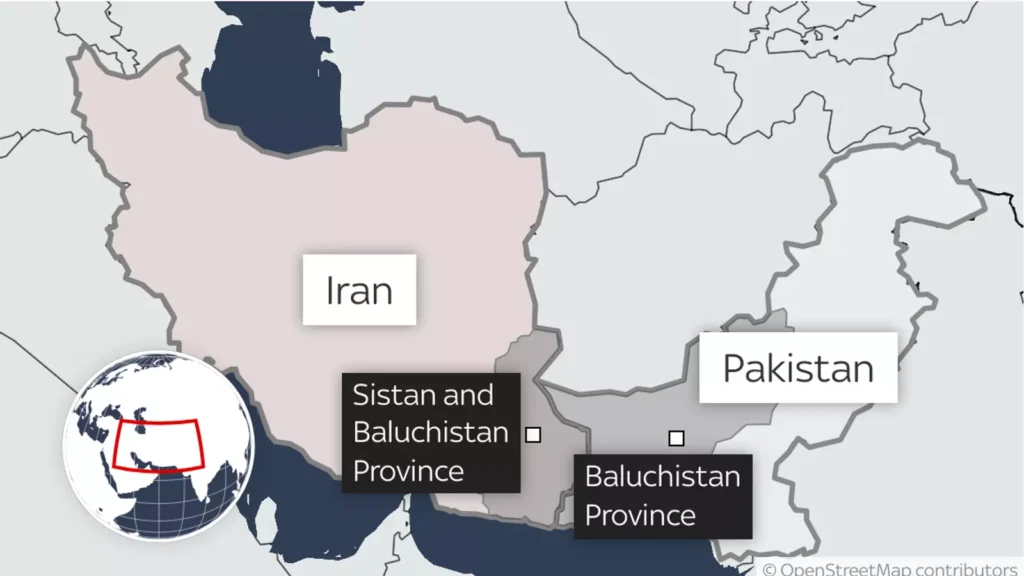
Iran and Pakistan exchange missiles
Featured image: Iran and Pakistan launched missiles against each other. Source: news18.com
On the 16th of January Iran launched missiles into Pakistan, killing at least two children in the strike which it said targeted the armed group Jaish al-Adl operating in the border region of Pakistan and Iran. The armed group has launched multiple attacks against Iranian security forces on the border region, and latest in December killed 11 members of the Iranian security forces. This December attack was however condemned by Pakistani officials. Pakistan first called back its ambassador to Iran and banned the Iranian ambassador from returning to Pakistan. On the 18th of January Pakistan fired back missiles, targeting the Balochistan Liberation Front (BLF) and the Balochistan Liberation Army (BLA) on the Iranian side of the border. The BLA has for decades been waging armed struggle against the Pakistani State and for example carrying attacks against representatives of Chinese social-imperialism in Pakistan. Both countries have accused each other of sheltering the armed groups.

The attacks on Pakistan occur in the context of longer pressure against Iran, and a series of attacks carried out by it in Syria and Iraq. An analyst said to the Qatari media Al Jazeera that Iran’s perception of threats in the region is increasing, and it is under increasing pressure internally and externally. In December, Israel killed an Iranian commander in a missile strike in Syria, and in early January, 90 people were killed in two explosions among a commemoration of the Iranian Islamic Revolutionary Guard Corps chief Qassem Soleimani, who was murdered by the US two years prior. The attack in January was the deadliest armed attack on Iranian territory in decades. It was claimed by the ISIS, but Iran said the attack was orchestrated by Israel. Therefore, it is necessary for Iran to display its military strength and reply to the pressure. It is however likely that there will not be a major escalation between the two States.
The target of the aggression of Iran was not of the official Pakistani military and in a sparsely populated area. Similarly, Pakistan attacked an armed group waging insurgency against it. In both attacks, civilians, among them children, died. The two countries were at the same time conducting joint operations on the Strait of Hormuz and the Persian Gulf and their ministers were shaking hands and smiling in Davos, and there has been some who suggest that the attacks were coordinated, even though this is unlikely according to analysts.
The US President Joe Biden said the clash showed that Iran is not well liked in the region. The US, who now has launched direct aggression towards Yemen, also again accused Iran of inflaming instability and “terrorism” in the area by violating the sovereignty of other States. Chinese social-imperialism, a major imperialist actor in both Pakistan and Iran, asked for restraint and proposed to act as a mediator. Russian imperialism also asked for restraint and “peace”.
Even if escalation is not likely, the chances of it are not non-existent. Pakistan is acting as a lackey of US imperialism, which is seeking to combat the influence of Chinese social-imperialism as well as Russian imperialism in the region. The ousting of Imran Khan, the former prime minister of Pakistan, by a vote of no-confidence was orchestrated by US imperialism according to leaked documents, on which we have written earlier. The position of Khan’s government was seen as too friendly towards Russian imperialism, and the US threatened with consequences if he was not removed. Khan was then banned from politics and sentenced to prison, and him and his cabinet were not allowed to participate in the new elections, which were supposed to take place in August 2023 but were delayed to February this year. Currently the post is held by a care-taker prime minister Anwaar ul Haq Kakar. “Human rights” organizations have said it is very unlikely the elections will be “free and fair”.
In the complex situation it can be seen that the imperialists are pitting their lackeys against each other, inflaming aggression and instability in the region for their interests. The ones who again pay the price with their blood are the people.

